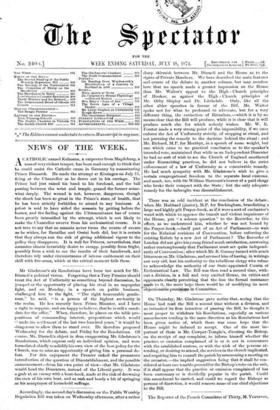Mr Gladstone's six Resolutions have been too much for Mr.
Disraeli's political virtue. Forgetting that a Tory Premier should treat the Act of Uniformity as something beyond discussion, he jninped at the opportunity of placing his rival in an unpopular light, and on Monday, in a speech on public business, challenged him to the fight. "The right honourable gentle- man," he said, "is a person of the highest authority in 'the realm. He has recently been Prime Minister, and I have a right to suppose, and am happy to believe, that he is still a candi- date for the office." When, therefore, he places on the table pro- positions of commanding interest, propositions which would " undo the settlement of the last two hundred years," it would be dangerous to allow them to stand over. He therefore proposed Wednesday for the debate, and Friday for the Resolutions. Of course, Mr. Disraeli's object in thus exaggerating Mr. Gladstone's Resolutions, which express only an individual opinion, and were formulated chiefly to solidify his own view of the best policy for the Church, was to seize.an opportunity of giving him a personal de- feat.. For this enjoyment the Premier risked the premature introduction of the question of Disestablishment, and the possible announcement—from his own point of view—that Mr. Gladstone would head the Dissenters, instead of the Liberal party. It was a grab at an enemy with a boat-hook, made at the risk of drowning the crew of his own boat, and as rash and heady a bit of springing as his acceptance of household suffrage.


































